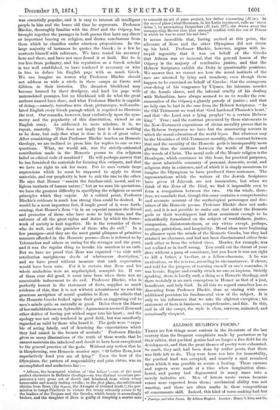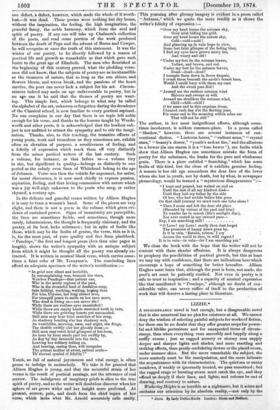ALLISON HUGHES'S POEMS.* Tnsns are few things more curious in
the literature of the last century than the frequent complaints made by poetasters or by their critics, that poetical genius had no longer a free field for its development, and that the great themes of poetry were exhausted. So much, they said, had been done by earlier poets, that there was little left to do. They were born too late for immortality, the poetical land was occupied, and scarcely a spot remained upon which it was possible to secure a footing. These excuses and regrets were made at a time when imagination slum- bered, and poetry had degenerated in many cases into a merely imitative art. Men of letters wrote verses because verses were expected from them ; mechanical ability was not wanting, and there are often marks in these compositions of consummate skill. Indeed, this kind of verse-making had but
• Penelope, and other Poems. By Allison Hughes. London : Henry S. King and Co. one defect, a defect, however, which made the whole of it worth- lesti,—it was dead. These poems were nothing but dry bones, without the inspiration, the feeling, the high imagination, the graceful fancy, the noble harmony, which form the soul and spirit of poetry. If any one will take up Chalmers's collection of the poets, and read some portion of the work produced between the death of Pope and the advent of Burns and Cowper, he will recognise at once the truth of this statement. It was the winter of our poetry, to be shortly followed by a season of poetical life and growth as remarkable as that which gave such lustre to the great age of Elizabeth. The men who flourished at the beginning of this century proved, what the plodding verse- men did not know, that the subjects of poetry are as inexhaustible as the treasures of nature, that so long as the sun shines, and flowers bloom, and waves break, and the passions of the heart survive, the poet can never lack a subject for his art. Circum- stances indeed may make an age unfavourable to poetry, but in no age can it be said that the themes of poetry are want- ing. This simple fact, which belongs to what may be called the alphabet of the art, unknown or forgotten during the decadence of the Classical school, is now familiar to every poetical aspirant. No one complains in our day that there is no topic left noble enough for his verse, and thanks to the lessons taught by Words- worth and other poets, it is acknowledged that the lowliest sub- ject is not unfitted to attract the sympathy and to stir the imagi- nation. Thanks, also, to this teaching, the tentative efforts of young poets, weak and tremulous as they sometimes are, exhibit often an elevation of purpose, a sensitiveness of feeling, and a felicity of expression which mark them off very distinctly from the minor poetical writers of the last century. Such a volume, for instance, as that before us—a volume tiny in size, but significant in quality—belongs as distinctly to our period as the calmly even lines- of Whitehead belong to the age of Johnson. Verse was then the vehicle for argument, for satire, for moral discourses, it is now used chiefly to express passion, aspiration, feeling, and that loving communion with nature which was a joy well-nigh unknown to the poets who sang, or rather rhymed, a century ago.
In the delicate and graceful verses written by Allison Hughes it is easy to trace a woman's hand. Some of the pieces are very slight, and there is not a poem in the volume which gives evi- dence of sustained power. Signs of immaturity are perceptible, the lines are sometimes feeble, and sometimes, though more rarely, inharmonious, the thought is frequently visionary, and the poetry, at its best, lacks substance ; but in spite of faults like these, which may be the faults of genius, the verse, thin as it is, is, for the most part, of pure quality and free from pinchbeck. "Penelope," the first and longest poem (less than nine pages in length), shows the writer's sympathy with an antique subject from which it might be thought all the poetry was already ex- tracted. It is written in musical blank verse, which carries some- times a faint echo of Mr. Tennyson's. 'lhe concluding lines afford an adequate specimen of the writer's versification :—
"In grief now silent and invisible,
In uncomplaining woe, beneath the stars, Watches Penelope—that patient one, Who in the misty regions of the past, Who in the dreamful land of deathless song, Sato faithful, working, waiting, hoeing thus For him, Ulysses, her long absent love, For tranquil peace to smile on her once more, Who dead is living on—can never die !
While there are restless eyes unsatisfied !
While there are empty hands stretched forth in vain, While there are grieving hearts yet unconsoled.
Still men may hear faint snatches of her song, As shadowy bending o'er her shadowy web, As wraithlike, morning, noon, and night, she flings, The shuttle swiftly o'er her ghostly loom ;- Still men may catch brief glimpses of her form, As hour by hour steals past her swiftly by, As day by day descends into the dark, Leaving her solitary toiling on, And hearing, seeing thus, will recognise The primal mother of sweet, patient souls- Th' eternal symbol of fidelity !"
Youth, so full of natural joyousness and vital energy, is often prone to indulge in melancholy. We take it for granted that Allison Hughes is young, and that the mournful strain of her verses is the result of poetical musings, not the utterance of real sorrow. The indulgence of imaginary griefs is alien to the true spirit of poetry, and so the writer will doubtless discover when her sphere of art grows wider and her insight more profound. At present, sorrow, pain, and death form the chief topics of her verse, which lacks what Mr. Arnold accurately calls sanity. This yearning after gloomy imagery is evident in a poem called "Autumn," which we quote the more readily as it shows the writer's felicity of expression :—
" Over my head looms the autumn sky, Grey mist hiding the gold.
Over my head looms the autum sky, Cold—cold—cold !
And glancing up in vain hope to view, Some last faint glimpse of the fading blue, I find my eyes have grown misty too, And weary and old !
"Under my feet lie the autumn leaves, Yellow, and brown, and red.
Under my feet lie the autumn leaves, Dead—dead—dead I I trample them down in fierce despair, I crush them beneath the earth's breast bare, Would I could bury with them my care And the sweet past fled !
"Around me the restless autumn wind Shivers and sweeps at will.
Around me shudders the autumn wind, Chill—chill—chill!
0 for some end to this requiem drear, Chanted each day o'er the fleeting year, For some end to the moaning within mine ear That will not be still "
The author, in her most insignificant efforts, although some- times incoherent, is seldom common-place. In a poem called " Shadow," however, there are several instances of con- ventional diction. " Lustrous hours," " radiant arms," " crystal stars," " beauty's dower," "youth's ardent fire," and the allusions to a bower (in one stanza it is a "lone bower "), are faults which show that Allison Hughes can sometimes mistake the form of poetry for the substance, the husks for the pure and wholesome grain. There is a piece entitled " Searching," which has some faults of this kind, but the close of it exhibits genuine feeling. A woman in her old age remembers the dear face of the lover whom she lost in youth, not by death, but by what, in newspaper phraseology, would be termed a " mysterious disappearance ":-
"I wept and prayed, but waited on and on Until the last of all my kindred died—
Until they laid my father by the side Of her, who had awhile before him gone On that chill journey we must each one take alone !
"Then I arose and left the dear old place ' (Haunted by visions of the past and him) To wander far in search (life's sunlight dim),
Nor ever rested in my onward pace— Nay, I am searching still'
"0 Love! my Love! surely thou dost forget The promises of happy years gone by.
Is it in vain, ' Return, return,' I cry Across the world to thee, in wild regret ? It is in vain—in vain—forI am searching yet."
We close the book with the hope that the writer will not be content with these slender effusions. It is always dangerous to prophesy the possibilities of poetical growth, but this at least we may say with confidence, that there are indications here which encourage a hope of something far better hereafter. Allison Hughes must learn that, although the poet is born, not made, the poet's art must be patiently studied. Not even in poetry is it safe to trust to inspiration ; and a capacity of musical expression like that manifested in " Penelope," although no doubt of con- siderable value, can never• suffice of itself to the production of work that will deserve a lasting place in literature.







































 Previous page
Previous page